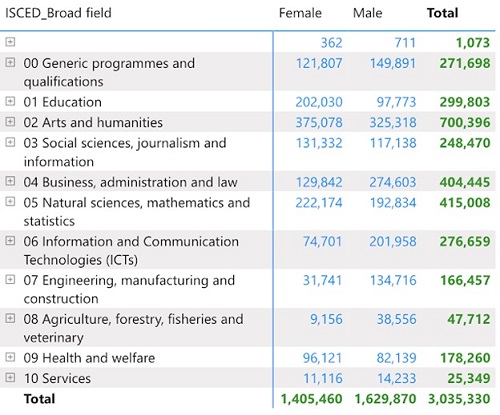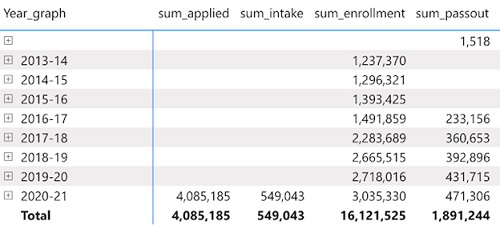Over a Million Pakistani University Students Enrolled in STEM Fields
By Riaz Haq

Over a million students, about a third of total 3 million students (1.4 million women, 1.6 million men) enrolled in Pakistani universities and degree colleges, are currently studying science, technology, engineering and mathematics (STEM), according to data released by the country's Higher Education Commission ( HEC ). Of these students, 415,008 are studying natural sciences and mathematics, 276,659 are in information and communication technologies (ICT), 178,260 are in health sciences and 166,457 are in engineering.
Pakistan produced 157,102 STEM graduates last year, putting it among the world's top dozen or so countries. About 43,000 of these graduates are in information technology (IT).

|
Student enrollment by field of study at Pakistani higher education institutions - Source: HEC |
Acceptance rate in Pakistani universities and degree colleges was just 13.5% last year. Only 471,306 students were accepted from 4,085,185 students who had applied. The country produced 471,306 university graduates in 2020-21. Of these, 157,102 were in STEM fields , including 43,000 graduates in information technology (IT).

|
Pakistan higher education admission and graduation statistics - Source: HEC |
In absolute terms, Pakistan probably ranks among the top dozen or so nations producing university graduates in STEM and IT fields. However, the country lags significantly behind its lower middle income peers in terms of percentage of students enrolled in universities. Only 12% of young people in the 18-25 age group are currently enrolled in higher education institutions. This is about half of the 25% average for South Asia. The data from the Word Bank shows that higher education enrollment rate was extremely low in Pakistan until 2000 when late President Musharraf decided to significantly boost investment in building universities and hire faculty to rapidly increase access to higher education in the country.
As Pakistan struggles with multiple serious crises, these young men and women now studying in the nation's universities and colleges offer hope for its bright future. In fact, the vast majority of Pakistanis feel that they enjoy better lives than their parents, and they think their children will have even better lives than theirs, according to a Gallup International Poll of 64 countries conducted from August to October last year.
The poll asked two questions: 1) Do you feel your life is better, worse or roughly similar to that of your parents? and 2) Do you think your children will have a better, worse or roughly the same life as you? The answers to these questions reveal that Pakistanis are among the top 5 most positive nations among 64 countries polled by Gallup International. Anecdotal evidence in terms of packed shopping malls and restaurants in Pakistan's major cities confirms this trend. Such positivity augurs well for Pakistan's prospects of successfully dealing with the current crises. It will drive the nation's recovery.
(Riaz Haq is a Silicon Valley-based Pakistani-American analyst and writer. He blogs at www.riazhaq.com )

